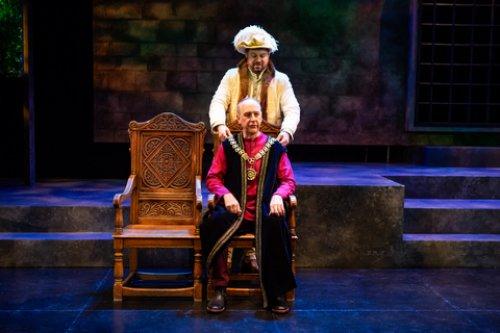A Man for All Seasons
Robert Bolt’s Tony and Academy Award winning play receives a conventional but unimaginative revival.

Michael Countryman as Sir Thomas More and Trent Dawson as King Henry VIII in a scene from Fellowship for Performing Arts’ revival of Robert Bolt’s “A Man for All Seasons” (Photo credit: Jeremy Daniel)
[avatar user=”Victor Gluck” size=”96″ align=”left” ] Victor Gluck, Editor-in-Chief[/avatar]The story of a man of conscience who faced death for his beliefs seems extremely timely and relevant in 2019 in the age of fake news, flagrant racism, anti-Semitism, the rise of white supremacists, and attacks on the fourth estate. We live in a time when too many people are afraid to speak out and put their consciences to the test. Robert Bolt’s A Man for All Seasons which tells the story of Sir Thomas More, martyred for his beliefs during the reign of King Henry VIII, was acclaimed in 1962 when it won the Tony Award for Best Play and later won the Academy Award for Best Film in 1967 as well as the Best Actor award for Paul Scofield in the leading role.
In recent years the play has not fared with such acclaim. A 2008 Broadway revival starring Frank Langella eliminated the narrator character of The Common Man, the play’s cleverest device, and was not well received. Now Fellowship for the Performing Arts has brought the play to the Theater Row’s Acorn Theatre directed by Christa Scott-Reed, who also staged FPA’s revival of Shadowlands last season. Unfortunately, the academic and unimaginative production fails to bring the ideas and the tensions in the play to a boil.
The play is set in and around London, from 1526-1535, during the reign of King Henry VIII and narrated by The Common Man, a clever device of the author to pull us into the 16th century. Sir Thomas More, a lawyer, author and statesman, is one of the most admired men in England and highly respected by the king. However, trouble is brewing for him as the king wishing a male heir wants to obtain a divorce from his 48 year old wife Queen Catherine who had failed to give him a son. When Cardinal Wolsey, the Lord Chancellor of England, asks More to approve a letter to the pope requesting this dispensation, he refuses to approve it. When Wolsey dies suddenly, More is made Chancellor and is no longer a private citizen but a member of the king’s government. When the king visits him at home to hear his thoughts on the divorce, More angers him by his objections. However, the king agrees not to hold it against him as long as he remains silent on the topic. In the meantime, Thomas Cromwell, formerly the cardinal’s secretary and now adviser to King Henry, is gathering information about More’s life and opinions in order to undermine him.

Michael Countryman as Sir Thomas More and Carolyn McCormick as his wife Lady Alice in a scene from Fellowship for Performing Arts’ revival of Robert Bolt’s “A Man for All Seasons” (Photo credit: Jeremy Daniel)
When the pope rejects the king’s request, the king gets Parliament to pass the Act of Supremacy establishing the Church of England and appointing the king as its head. When the Catholic bishops of England agree to support the act, More resigns as Lord Chancellor and hopes to be left alone as a private person. However, in this he is mistaken as his opinion and beliefs are too important. Cromwell given greater powers by the king seeks to bring the now impoverished More down with charges of bribery which do not stick. Parliament passes another act which requires all to swear an oath to the king’s supremacy over the Church of England and to the legitimacy of the king’s remarriage to Anne Boleyn.
While his family does not understand Sir Thomas’ reasons for keeping silent, they suffer under his lack of income. Unfortunately, Cromwell looks for every possible way to get More to change his mind or to bring him down with the king’s blessing. Ultimately, More’s doom is sealed. Circling Sir Thomas More throughout the play are the wily Spanish Ambassador to Catholic King Philip who is nephew to Queen Catherine and who considers More an ally, and a young man Richard Rich who comes to More for advice but does not get the favor he wanted.
Director Scott-Reed has allowed the actors to play only one note in each of their characters which makes the play rather flat and monotonous. Michael Countryman as Sir Thomas More captures his honesty and integrity but misses his wry sense of humor which makes him rather dull. As The Common Man, Harry Bouvy gets to play a servant to Sir Thomas, a boatman, a jury foreman and an executioner, among others. While he seems to be enjoying himself enormously, he plays all of these characters the same way. Kevyn Morrow’s The Duke of Norfolk can’t seem to make up his mind if he is a swashbuckling man of the 16th century or a serious statesman. As Richard Rich, a young acquaintance of More’s, David McElwee plays only the driving ambition of this man but not his wiliness.

Todd Cerveris as Thomas Cromwell and David McElwee as Richard Rich in a scene from Fellowship for Performing Arts’ revival of Robert Bolt’s “A Man for All Seasons” (Photo credit: Jeremy Daniel)
Some of the actors make their characters both more interesting and more well-rounded. Todd Cerveris makes Thomas Cromwell, the king’s confidant and Sir Thomas’ nemesis, a very sinister presence. As Sir Thomas’ wife, Lady Alice, Carolyn McCormick is both feisty and contentious. John Ahlin’s Sigñor Chapuys as the Spanish Ambassador is delightfully shrewd and sly. Kim Wong makes Margaret More, Sir Thomas’ daughter, a very modern woman for the Renaissance. As her fiancé and later husband, Sean Dugan as the lawyer William Roper has some of the fire that much of the cast lacks. Appearing only in one scene, Trent Dawson’s King Henry VIII is a hearty bon vivant who has a witty repartee.
Steven C. Kemp’s unit set for this multi-scened drama of two platforms at differing levels and several pieces of wooden furniture is serviceable but offers little period atmosphere. The costumes by Theresa Squire are attractive but it becomes obvious quite quickly that each actor has been dressed in a separate color and the concept then becomes trite. John Gromada’s music and sound as well as the lighting by Aaron Porter are unobtrusive and suitable.
Robert Bolt’s stage masterpiece, A Man for All Seasons, has been considered one of the most successful historical biography plays of modern times. However, its very understatement and play of ideas make it a difficult work to bring off on the stage. The Fellowship for Performing Arts is to be applauded for attempting this important and relevant work in our times, but the results under the direction of Christa Scott-Reed sorely limit the scope of the play by an underwhelming and conventional staging.
A Man for All Seasons (extended through March 3, 2019)
Fellowship for Performing Arts
Acorn Theatre at Theatre Row, 410 W. 42nd Street, in Manhattan
For tickets, call 212-947-8844 or visit http://www.FPAtheatre.com
Running time: two hours and 25 minutes with one intermission






Leave a comment